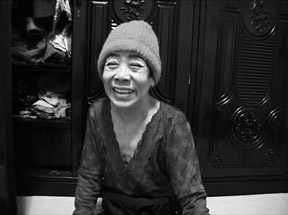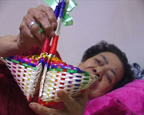We’ve never seen a night which has finished by reaching a day
On a jamais vu de nuit qui ne finisse par atteindre le jour FRANCE, KOREA / 2010 / Korean, French / Color / Blu-ray (SD) / 41 min
FRANCE, KOREA / 2010 / Korean, French / Color / Blu-ray (SD) / 41 min
Director, Photography, Editing, Sound: Lee Ju-hyoung
Assistant Director: Son Seon-kyung
Source: Lee Ju-hyoung
The director encountered an elderly woman who lives in the “House of Sharing.” A theatrical work about a prostitute in the Algerian War and testimonies from the former “comfort woman” of the Japanese military are presented in parallel and resonate in the darkness across time and space. The director, who studied and made this work in France, quietly but surely shows the massive history of colonialism, not necessarily only that of Japan and Korea, through his daily conversations with the elderly woman, with whom his relationship seems like that of grandmother and grandchild. Memories of invasion are etched in the space between the aged woman and the director’s intimate camera.
 [Director’s Statement] Long after the Korean War, this torn, worn, and aged woman’s unbearable scar is still wide open because the so-called society’s perspective has fixed its eye on her as “other,” “impaired,” “misfit.”
[Director’s Statement] Long after the Korean War, this torn, worn, and aged woman’s unbearable scar is still wide open because the so-called society’s perspective has fixed its eye on her as “other,” “impaired,” “misfit.”
Most of the documentary films addressing the “war comfort women” approached them as a collective mass instead of revealing each woman’s wound at the most personal level.
Skepticism rises as the women are confined in the boundaries of mere historical figures instead of being seen as living persons. This is the reason why this documentary describes the woman’s individual and personal life, scarred from the tragic history she experienced up-close and personally.
I could not find an answer to a question that haunted me during the filming: the question of whether I was being her companion or just an intruder in her life.
She began her first word with hope but soon ended with despair, and I began to believe she is trapped in a dark abyss of sadness. In order to capture the essence of her emotion and feelings, this film is structured with a constant change of darkness and brightness and is mostly just sounds without image.
I wanted to express her pain and sorrow torn between memoir and reality, deprivation and hope.
 Lee Ju-hyoung
Lee Ju-hyoung
Lee Ju-hyoung has filmed short animations and videos since majoring in fine arts in Korea. He studied film and documentary in France for seven years starting in 2004. Instead of focusing on one specific genre, he has acquired experience and knowledge in various genres related to arts and film. He produced three short animations and this documentary, which has been presented at many film and art festivals. Currently, he is making an experimental work that combines documentary with animation and that deals with the pain of second-generation Korean victims of the atomic bomb and their hereditary problems. |
